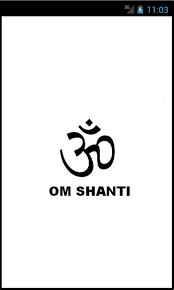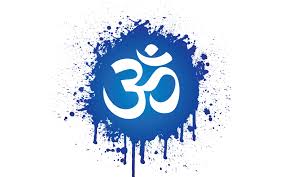Hari Om
Each 'Choose-day' we will investigate the process by which we can reassess our activity and interaction with the world of plurality and become more congruent within our personality.
PEACE IN A RESTLESS WORLD cont'd. (Guru-ji)
Guru-ji has written rather more at length on the final component of this exploration of the role of peace in life. Not surprising, as the most complex part of the whole equation is, in fact, the individual. This will be broken into two posts.
Peace in the Individual.
Peace at the individual level is within the reach of every one of us. It is easy to make excuses for the restlessness in society or the phenomenal world, but when it comes to ourselves, there are no excuses. Here we have to find peace within. Many people have found great peace in the midst of this restless world, which proves that only we are restless and we are superimposing that restlessness onto the world.
Let us thing about this a little deeper and examine the causes for our individual restlessness. There are three aspects of our lives which cause us anxiety; our body, our actions and our emotions (mind).
 When our body suffers from pain and disease or from fear of disease, that itself creates anxiety. So, we should first learn to take care of our physical health. Through proper exercise and right food, we can live a healthy life and we will enjoy great peace. When we are unhealthy, there is no enthusiasm, no energy and every little problem becomes a huge. Problems may never go away but a healthy body will give us the energy to deal with them as they come.
When our body suffers from pain and disease or from fear of disease, that itself creates anxiety. So, we should first learn to take care of our physical health. Through proper exercise and right food, we can live a healthy life and we will enjoy great peace. When we are unhealthy, there is no enthusiasm, no energy and every little problem becomes a huge. Problems may never go away but a healthy body will give us the energy to deal with them as they come.
The second cause of restlessness is our actions. In society, we are given a set of obligatory duties to be fulfilled and also prohibited actions to be avoided. If we do not fulfill our duties we become worried and agitated. When we act out a prohibited thing, our mind becomes even more anxious for fear of being caught. We should be very clear about this. If we want to have a really peaceful life at the level of actions, only obligatory duties (kartavya karma) should be done and should avoid the wrongful and prohibited. If we do not learn to discriminate between the dos and the don'ts then there will be trouble. Learning these things brings ease to the mind. This is basic social integration.
Let us now consider restlessness at the level of emotions. Our mind is a continuous flow of a variety of thoughts. Some thoughts create a very peaceful state of mind, some other thoughts and emotions create only restlessness in the mind, and yet other thoughts create a dullness. Swami Vidyananda in Panchadashi, gives a wonderful analysis of these thought patterns. He says that our mind goes through different states and the different thoughts create the different states. There is dull, called tamasika, causing ignorance, delusion and sloth. There is rajasika, which is an agitated and active mind, with thoughts of passion, lust, anger, jealousy and so on. Then there is sattvika, in which the thoughts are creative energetic, objective, sensitive, all of which are conducive to peacefulness.
 Relationships are a very important aspect of our emotional state. Our mind becomes restless and lot of tension is created when our relationships are strained. When the relationships are good, things are beautiful. Where there is mutual love between people, then laws, rules and regulations are not needed. When there is love, each person wants to give and give. However, where love is lacking, not a single rule will work. When there is love, people talk with each other. When there is no love, people talk at each other.
Relationships are a very important aspect of our emotional state. Our mind becomes restless and lot of tension is created when our relationships are strained. When the relationships are good, things are beautiful. Where there is mutual love between people, then laws, rules and regulations are not needed. When there is love, each person wants to give and give. However, where love is lacking, not a single rule will work. When there is love, people talk with each other. When there is no love, people talk at each other.
If relationships are based on material considerations, they will not last because the nature of the material is to change, decay and perish. In material considerations we seek some satisfaction in the form of appreciation, or recognition or other tangible gain.
Wise people have a spiritual relationship even with material things. they value this body, which is matter, as the most precious gift which is meant for seeking the realisation of Truth. This body is the primary means for fulfilling dharma and attaining liberation. They take care of the body with that attitude. when they have material wealth, they say it is meant for serving others, it is God's gift. Here, neither the body nor the material wealth cause bondage for the individual. For many, though, deeds are performed with expectation of some material gain. Then, if none is forthcoming, they may throw up their hands and declare, 'What is the sue of doing good things if I get nothing from it?!'

PEACE IN A RESTLESS WORLD cont'd. (Guru-ji)
Guru-ji has written rather more at length on the final component of this exploration of the role of peace in life. Not surprising, as the most complex part of the whole equation is, in fact, the individual. This will be broken into two posts.
Peace in the Individual.
Peace at the individual level is within the reach of every one of us. It is easy to make excuses for the restlessness in society or the phenomenal world, but when it comes to ourselves, there are no excuses. Here we have to find peace within. Many people have found great peace in the midst of this restless world, which proves that only we are restless and we are superimposing that restlessness onto the world.
Let us thing about this a little deeper and examine the causes for our individual restlessness. There are three aspects of our lives which cause us anxiety; our body, our actions and our emotions (mind).
The second cause of restlessness is our actions. In society, we are given a set of obligatory duties to be fulfilled and also prohibited actions to be avoided. If we do not fulfill our duties we become worried and agitated. When we act out a prohibited thing, our mind becomes even more anxious for fear of being caught. We should be very clear about this. If we want to have a really peaceful life at the level of actions, only obligatory duties (kartavya karma) should be done and should avoid the wrongful and prohibited. If we do not learn to discriminate between the dos and the don'ts then there will be trouble. Learning these things brings ease to the mind. This is basic social integration.
Let us now consider restlessness at the level of emotions. Our mind is a continuous flow of a variety of thoughts. Some thoughts create a very peaceful state of mind, some other thoughts and emotions create only restlessness in the mind, and yet other thoughts create a dullness. Swami Vidyananda in Panchadashi, gives a wonderful analysis of these thought patterns. He says that our mind goes through different states and the different thoughts create the different states. There is dull, called tamasika, causing ignorance, delusion and sloth. There is rajasika, which is an agitated and active mind, with thoughts of passion, lust, anger, jealousy and so on. Then there is sattvika, in which the thoughts are creative energetic, objective, sensitive, all of which are conducive to peacefulness.
Wise people have a spiritual relationship even with material things. they value this body, which is matter, as the most precious gift which is meant for seeking the realisation of Truth. This body is the primary means for fulfilling dharma and attaining liberation. They take care of the body with that attitude. when they have material wealth, they say it is meant for serving others, it is God's gift. Here, neither the body nor the material wealth cause bondage for the individual. For many, though, deeds are performed with expectation of some material gain. Then, if none is forthcoming, they may throw up their hands and declare, 'What is the sue of doing good things if I get nothing from it?!'
...tbc...
